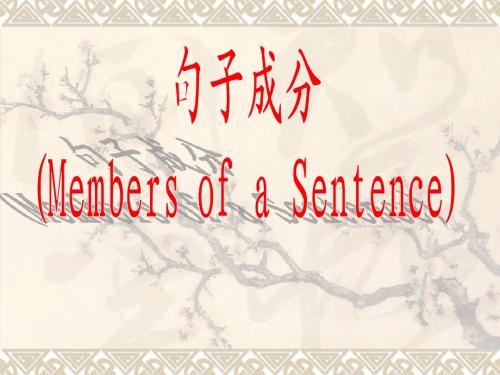高中英语——句子结构PPT课件
合集下载
高中基础语法知识--英语句子种类 共14张PPT

二、 委婉陈述人们在陈述事实的时候,为了礼貌或者为了在说话时留有余地,常常在说话时采用委婉陈述方 be, I think, too much for him. 我想那会使他受不了的。
(二)采用情态动词或半助动词来软化口气 He might be right. 他也许是对的。 She seems to be unhappy. 她似乎不快活。
Don't let him go. / Let him not go. 别让他走。
感叹句: what和how引导的感叹句
一、由感叹词what引导的感叹句。(修饰名词) 1.What+a/an+(形容词)+单数可数名词+主语+谓语!
如: What a fine day it is! 2. What+(形容词)+可数名词复数或不可数名词+主语+谓语!
疑问句: 分为一般疑问句和特殊疑问句
一般疑问句:be动词/助动词/情态动词开头的疑问句。 回答:yes/no。 特殊疑问句:特殊疑问词+一般疑问句。 回答:根据相关的句子意思进行相应的回答即可。
将陈述句变为 一般疑问句
1.带be动词的陈述句: she is a student 注意:I am a student
2.表转折关系的 but, however,while,still, yet The film is not perfect,still,it's good.
3.表选择关系的 or, either...or..., not...but... Take the chance,or you will regret it.
英语中千变万化的句子归根结底都是由以上五种基本句型组合、扩展、变化而来的
(二)采用情态动词或半助动词来软化口气 He might be right. 他也许是对的。 She seems to be unhappy. 她似乎不快活。
Don't let him go. / Let him not go. 别让他走。
感叹句: what和how引导的感叹句
一、由感叹词what引导的感叹句。(修饰名词) 1.What+a/an+(形容词)+单数可数名词+主语+谓语!
如: What a fine day it is! 2. What+(形容词)+可数名词复数或不可数名词+主语+谓语!
疑问句: 分为一般疑问句和特殊疑问句
一般疑问句:be动词/助动词/情态动词开头的疑问句。 回答:yes/no。 特殊疑问句:特殊疑问词+一般疑问句。 回答:根据相关的句子意思进行相应的回答即可。
将陈述句变为 一般疑问句
1.带be动词的陈述句: she is a student 注意:I am a student
2.表转折关系的 but, however,while,still, yet The film is not perfect,still,it's good.
3.表选择关系的 or, either...or..., not...but... Take the chance,or you will regret it.
英语中千变万化的句子归根结底都是由以上五种基本句型组合、扩展、变化而来的
高中英语高考英语句子结构分析(共35张PPT)

并列句的分类
1、表示连接两个同等概念,常用and, not only…but also…, neither…nor…, then等连接。 e.g. The teacher’s name is Smith, and the student’s name is John.
2、表示选择,常用的连词有or, either…or…, otherwise等。 e.g. Hurry up, or you’ll miss the train.
He worked hard all his life. (划线部分在 句中作状语,修饰动词worked)
He is a school student in No. 1 Middle School. (划线部分在句中作定语,修饰名 词student)
2) 并列句: 句型:简单句+并列连词+简单句
exam. 6) I like some of you very much. 7)If you study hard, you will pass the exam. 8)He goes to school by bike. 9)Though he is young, he can do it well.
位置 呢?
6、状语:它是修饰动词、形容词、副
词或全句用的。
1) I will go there tomorrow.
2) The meeting will be held in the meeting room. 3)The meat went bad because of the hot
weather. 4)He studies hard to learn English well. 5)He didn’t study hard so that he failed in the
高中英语句子成分基本句型精品课件

5. He│admits│that he was mistaken.
基本句型 四:S V o O (主+谓+间宾+直宾)
有些及物动词可以有两个宾语, e.g.
give/pass/bring/show。这两个宾语通常一个
指人(间接宾语); 一个指物(直接宾语)。 --Give me a cup of tea please. --Show this house to Mr. Smith. --Bring it to me, please.
同等位置时, 一个句子成分用来说明和解释
另一个句子成分, 这个句子成分就叫做它的
同位语。
We students should study hard.
(students是we的同位语, 都是指同一批“学生”)
We all are students.
(all是we的同位语, 都指同样的“我们”)
ห้องสมุดไป่ตู้ 四、独立成分:
谓语: 谓语由动词构成, 是英语时态、语态 变化的主角, 一般在主语之后。不及物动词 (vi.)没有宾语, 形成主谓结构。 如: We come.
S│V(不及物动词)
1. The sun│rose. 2. Who │cares? 3. What he said │does not matter.
4. They │talked for half an hour.
4. He│asked│me│to come back soon.
5. I │saw│them│getting on the bus.
a. S V b. S V P c. S V O d. S V o O e. S V O C
1. Pleas tell us a story. _______ d
高中英语_英语句子成分的分析与理解课件_牛津版必修1

(让步状语)
10.I am taller than he is.(比较状语)
(七) 挑出下列句中的状语(8分, 8分钟) ① There was a big smile on her face. ② Every night he heard the noise upstairs. ③ He began to learn English when he was eleven. ④ The man on the motorbike was travelling too fast. ⑤ With the medicine box under her arm, Miss Li hurried off. ⑥ She loves the library because she loves books. ⑦ I am afraid that if you've lost it, you must pay for it. ⑧ The students followed Uncle Wang to see the other machine.
主语是动作的主体部分
在主动句中:主语是动作的发出者
I teach you English.
在被动句中:主语是动作的承受者
You are beaten .
主语一般由名词、代词或数词充当。
We are good friends. –(代词)
主语还可以由从句或非谓语动词充当。 What I want to do is join the party. Smoking is harmful to your health. To learn English is difficult.
(八)状语
修饰动词、形容词、副词或整个句子,说明
10.I am taller than he is.(比较状语)
(七) 挑出下列句中的状语(8分, 8分钟) ① There was a big smile on her face. ② Every night he heard the noise upstairs. ③ He began to learn English when he was eleven. ④ The man on the motorbike was travelling too fast. ⑤ With the medicine box under her arm, Miss Li hurried off. ⑥ She loves the library because she loves books. ⑦ I am afraid that if you've lost it, you must pay for it. ⑧ The students followed Uncle Wang to see the other machine.
主语是动作的主体部分
在主动句中:主语是动作的发出者
I teach you English.
在被动句中:主语是动作的承受者
You are beaten .
主语一般由名词、代词或数词充当。
We are good friends. –(代词)
主语还可以由从句或非谓语动词充当。 What I want to do is join the party. Smoking is harmful to your health. To learn English is difficult.
(八)状语
修饰动词、形容词、副词或整个句子,说明
高中英语-句子成分及五种基本句型-课件

句子包括哪些成分?
句子成分详解表
句子成分
意义
充当词类
例句
主语
谓语 宾语 表语 定语 状语
表示句子说的是什么人或什么 事
说明主语做什么,是什么或怎 么样 表示动作行为的对象 与联系动词连用,一起构成谓 语,说明主语是什么,怎么样 用来修饰名词或代词
修饰动词,形容词,副词,表 示动作发生的时间,地点,原 因,目的,方式,结果等
名,代,数,不定 式,动名词,短语或 句子 动词或动词词组
同主语 同主语
形,代,数,名, 副,介词短语或句子 副词,介词短语或句 子
We study in HuangQiao Middle School.
She is dancing under the tree.
Both of us like English. Her father is a chemist. His words sound reasonable. We have eight lessons every day.
1.She lived a happy life.(名词 ) 2.I love you.( 代词) 3.We need two.( 数词) 4.Do you mind my opening the door?(动名词) 5.He began to learn English a year ago.(不定式 ) 6.He did not know what to say.( 疑问词+不定式) 7.Did you write down what she said? ( 从句 ) 8. She felt it her duty to take good care of them.
句子成分(2)
高中英语句子成分和结构讲解课件(修改版,共31张)

宾语
主 语
Members of a sentence
• • • • • • • • 主语 subject 谓语 predicate 宾语 object 表语 predicative 宾补 complement 定语 attribute 状语 adverbial 同位语 appositive
I met my best friend Tom at the station yesterday. ↓ ↓ ↓ ↓ ↓ ↓ 主 谓 定 宾 同 状 语 语 语 语 位 语 语
那里的风景非常漂亮.
The scenery there is very beautiful.
⑨
表方式: like that, as, as if…
不要那样看我.
Don’t look at me like that!
⑩
表伴随状况:
老师走进教室,手里拿着一本书.
The teacher came into the classroom, catching a book in his hand.
①
表时间:yesterday, today, tomorrow…
我们是今天还是明天出去买东西啊?
Shall we go shopping today or tomorrow?
②
表地点:in China, at the airport…
我在教室里看见一个学生.
I saw a student in the classroom.
●please pass me the book. ●He bought his girlfriend some flowers.
(四) 定语:(attribute) (Noun/Pronoun) 这是一节生动有趣的课. 前置定语
外研版2019高中英语必修第一册Unit 1 Grammar句子成分及基本句子结构课件

(1) She is my sister. (2) I have a dream. (3) I consider(认为) him my best friend. (4) The machine works well. (5) Jack gave me a book yesterday.
主系表 主谓宾 主谓宾宾补 主谓状 主谓双宾
4.主谓双宾 S + V + O O ubject
erb
bject(indirect) + bject (direct)
He gave me a smile. I passed him a book.
基本句型
Unit 1 A new start Using language
5.主谓宾宾补
S + V + O C ubject
句子成分及基本句型
Sentence Constituents &
Basic Sentence Structures
Wendy
句子成分
Sentence Constituents
Part 1
句子成分 Sentence constituents
Unit 1 A new start Using language
➢ 最富有特点的是长句
基本句型
基本句型
英语语言特点 Features of English language
_主__语_、__谓_语__、__宾_语__、_表__语___ are the main parts of sentences.
Unit 1 A new start Using language
Part 3
小试牛刀
Andy fell embarrassed
高中英语简单句五种基本句型_ PPT课件 图文

teachers listening to an important report. 我们发现大礼堂坐满了学生和教师,在听一个重要报 告。
We found the great hall full of students and
teachers listening to an important report m__a_d_e__b_y_a__c_o_m_r_a_d_e_ from the People's Daily on
基本句型一:S +V
(主+谓)
基本句型二:S +V +P (主+谓/系+表)
基本句型三:S +V +O (主+谓+宾)
基本句型四: S +V +InO +DO(主+谓+间宾+直宾)
基本句型五: S +V +O +OC(主+谓+宾+宾补)
各种词类及其在句子中的作用:
1. Nouns (n.) 名词:
e.g. We like th.她经常帮她妈妈。
She often helps
2. 我想要一杯茶。
I
want
O her mother. a cup of tea.
基本句型 四
S +V +InO +DO(主+谓+间宾+直宾)
特点:谓语动词必须跟有两个宾语才能表达完 整的意思。这两个宾语一个是动作的直 接承受者,另一个是动作的间接承受者。 通常可改为
S
between about AD 450 and 1150)was very
At.(定语)
V
different from the English(spoken today).
We found the great hall full of students and
teachers listening to an important report m__a_d_e__b_y_a__c_o_m_r_a_d_e_ from the People's Daily on
基本句型一:S +V
(主+谓)
基本句型二:S +V +P (主+谓/系+表)
基本句型三:S +V +O (主+谓+宾)
基本句型四: S +V +InO +DO(主+谓+间宾+直宾)
基本句型五: S +V +O +OC(主+谓+宾+宾补)
各种词类及其在句子中的作用:
1. Nouns (n.) 名词:
e.g. We like th.她经常帮她妈妈。
She often helps
2. 我想要一杯茶。
I
want
O her mother. a cup of tea.
基本句型 四
S +V +InO +DO(主+谓+间宾+直宾)
特点:谓语动词必须跟有两个宾语才能表达完 整的意思。这两个宾语一个是动作的直 接承受者,另一个是动作的间接承受者。 通常可改为
S
between about AD 450 and 1150)was very
At.(定语)
V
different from the English(spoken today).
高中英语句子成分和句型课件

eleven.
一个完整的句子做状语, 那么这个句子叫状语从句。
试一试:
(一). 指出下列句中主语的中心词 . ① The teacher with two of his students is walking into the classroom. ② There is an old man coming here. ③ The useful dictionary was given by m y mother last year. ④ To do today's homework without the teacher's help is very difficult.
句子
• • • • •
常见的系动词有: be(am,is,are,were,was), look,seem,feel,smell,taste,sound, keep,stay,become,get,grow,come,go, ….
The cake tastes nice. The water feels cold. These stories sound interesting.
一个完整的句子做表语, 那么这个句子叫表语从句。
(四) 挑出下列句中的宾语补足语 ① He asked her to take the boy out of school. ② She found it difficult to do the work. ③ They call me Lily sometimes. ④ I saw Mr. Wang get on the bus.
(三)宾语 表示动作的对象,是动作的承受者。 动词/动词短语 介词 宾语一般放在___________之后。_____词 后也会跟宾语。 • She covered her face with her hands. 名词 n • We haven't seen her for a long time. 代词 pron • Do you mind opening the window? 动名词 • Give me four please. 代词和数词 • He wants to dream a nice dream. to do不定式 • We need know what others are doing. 句子 • We should care more about our friends. 介词+名词
一个完整的句子做状语, 那么这个句子叫状语从句。
试一试:
(一). 指出下列句中主语的中心词 . ① The teacher with two of his students is walking into the classroom. ② There is an old man coming here. ③ The useful dictionary was given by m y mother last year. ④ To do today's homework without the teacher's help is very difficult.
句子
• • • • •
常见的系动词有: be(am,is,are,were,was), look,seem,feel,smell,taste,sound, keep,stay,become,get,grow,come,go, ….
The cake tastes nice. The water feels cold. These stories sound interesting.
一个完整的句子做表语, 那么这个句子叫表语从句。
(四) 挑出下列句中的宾语补足语 ① He asked her to take the boy out of school. ② She found it difficult to do the work. ③ They call me Lily sometimes. ④ I saw Mr. Wang get on the bus.
(三)宾语 表示动作的对象,是动作的承受者。 动词/动词短语 介词 宾语一般放在___________之后。_____词 后也会跟宾语。 • She covered her face with her hands. 名词 n • We haven't seen her for a long time. 代词 pron • Do you mind opening the window? 动名词 • Give me four please. 代词和数词 • He wants to dream a nice dream. to do不定式 • We need know what others are doing. 句子 • We should care more about our friends. 介词+名词
高中英语Unit4Bodylanguage一轮复习课文句子结构分析(课件)

状定主系表
试卷讲评课件
25. _A___sm__il_e_ _c_a_n__h_e_l_p_ __u_s_ _g_e_t__th_r_o_u_g_h__d_if_f_ic_u_l_t _s_i_tu_a_t_io_n_s_ and _f_i_n_d_ _f_r_ie_n_d_s_
主 谓 宾 宾补 谓 宾 __in__a__w_oபைடு நூலகம்r_l_d__o_f _s_t_ra_n_g_e_r_s_. 状 26. _A___sm__il_e_ _c_a_n__b_r_e_ak__d_o_w__n_ __ba_r_r_ie_r_s_. 主谓宾
主 后置定 系 表 状 __o_v_er__y_o_u_r__s_to_m__a_ch__ _a_f_te_r__a__m_e_a_l_.
状状 23. _S_o_m__e__b_o_d_y__la_n_g_u_a_g_e_ _h_a_s_ _m__a_n_y__d_if_f_e_re_n_t_ _u_s_e_s_. 主谓定宾 24. _P_e_r_h_a_p_s_ _t_h_e__b_e_st_ _e_x_a_m_p_l_e_ _i_s_ __sm__il_in_g__.
试卷讲评课件
13. _H__o_w_e_v_e_r_, __y_o_u_ _s_h_o_u_ld__a_v_o_i_d_ _m__a_k_in_g__t_h_is__g_e_s_tu_r_e_ _i_n__B_r_a_z_il_ 状主谓宾状 _a_n_d__G__e_rm__a_n_y_, [__as__i_t_i_s__n_o_t _c_o_n_s_id_e_r_e_d__p_o_li_t_e_].
试卷讲评课件
[定从] 6. _F_o_r__e_x_a_m_p_l_e_, _m__a_k_in_g__e_y_e__c_o_n_ta_c_t_—_l_o_o_k_in_g__i_n_to__s_o_m__eo_n_e_'_s_e_y_e_s_
试卷讲评课件
25. _A___sm__il_e_ _c_a_n__h_e_l_p_ __u_s_ _g_e_t__th_r_o_u_g_h__d_if_f_ic_u_l_t _s_i_tu_a_t_io_n_s_ and _f_i_n_d_ _f_r_ie_n_d_s_
主 谓 宾 宾补 谓 宾 __in__a__w_oபைடு நூலகம்r_l_d__o_f _s_t_ra_n_g_e_r_s_. 状 26. _A___sm__il_e_ _c_a_n__b_r_e_ak__d_o_w__n_ __ba_r_r_ie_r_s_. 主谓宾
主 后置定 系 表 状 __o_v_er__y_o_u_r__s_to_m__a_ch__ _a_f_te_r__a__m_e_a_l_.
状状 23. _S_o_m__e__b_o_d_y__la_n_g_u_a_g_e_ _h_a_s_ _m__a_n_y__d_if_f_e_re_n_t_ _u_s_e_s_. 主谓定宾 24. _P_e_r_h_a_p_s_ _t_h_e__b_e_st_ _e_x_a_m_p_l_e_ _i_s_ __sm__il_in_g__.
试卷讲评课件
13. _H__o_w_e_v_e_r_, __y_o_u_ _s_h_o_u_ld__a_v_o_i_d_ _m__a_k_in_g__t_h_is__g_e_s_tu_r_e_ _i_n__B_r_a_z_il_ 状主谓宾状 _a_n_d__G__e_rm__a_n_y_, [__as__i_t_i_s__n_o_t _c_o_n_s_id_e_r_e_d__p_o_li_t_e_].
试卷讲评课件
[定从] 6. _F_o_r__e_x_a_m_p_l_e_, _m__a_k_in_g__e_y_e__c_o_n_ta_c_t_—_l_o_o_k_in_g__i_n_to__s_o_m__eo_n_e_'_s_e_y_e_s_
高中英语句子成分和基本结构2(共25张PPT)

• Mike 吃了三个苹果。 Mike ate three apples.
• 她画了一幅漂亮的画。
• She drew a beautiful picture.
4、主语+及物动词+双宾语(间接 宾语+直接宾语)(SVIOO)(SVOiO)
• 常带双宾语(直接宾语和间接宾语)的 动词(分为A、B两类) A:动词后加to
give 给 show给……看 send寄,打电报 bring带…… read读…… pass递给…… lend借给……
hand交给…… tell告诉…… return把……还给… write给……写信 throw扔……
leave留给……
•B:动词后加for make生产,制造…… buy买 do做 get得到 play演奏 order命令 sing唱歌 pay为……交钱
I want to learn English. 4.我真的想要学英语。
I really want to learn English. 5.把2、4合成一个句子。
I am a clever student and I really want to learn English.
I am a clever student who really want to learn English.
1.They work hard. 主 + 谓 2.The flower is dead. 主 + 系 + 表 3.Plants need water. 主 + 谓 + 宾 4.He gives me some seeds.
主 + 谓 + 间宾 + 直宾 • 5.We should keep the plants in the shade.
• 她画了一幅漂亮的画。
• She drew a beautiful picture.
4、主语+及物动词+双宾语(间接 宾语+直接宾语)(SVIOO)(SVOiO)
• 常带双宾语(直接宾语和间接宾语)的 动词(分为A、B两类) A:动词后加to
give 给 show给……看 send寄,打电报 bring带…… read读…… pass递给…… lend借给……
hand交给…… tell告诉…… return把……还给… write给……写信 throw扔……
leave留给……
•B:动词后加for make生产,制造…… buy买 do做 get得到 play演奏 order命令 sing唱歌 pay为……交钱
I want to learn English. 4.我真的想要学英语。
I really want to learn English. 5.把2、4合成一个句子。
I am a clever student and I really want to learn English.
I am a clever student who really want to learn English.
1.They work hard. 主 + 谓 2.The flower is dead. 主 + 系 + 表 3.Plants need water. 主 + 谓 + 宾 4.He gives me some seeds.
主 + 谓 + 间宾 + 直宾 • 5.We should keep the plants in the shade.
高中英语 语法过关句式结构辅导课件

4.强调句型用于强调not...until...句型。 形式:it is/was not until+被强调部分+that... It was not until ten o’clock that he went to bed.
5.强调句型与状语从句、定语从句的区别。 判断是否为强调句型,可先把it is/was...that/when/where/since... 去掉,如果剩下的部分无论在语法上还是在意义上都仍然是完 整的句子,那么就是强调句型,否则就不是。
3.强调句型用于强调特殊疑问句。 形式:疑问词+is/was it that...? Who was it that broke the window? 打破窗子的是谁? 此时,强调句型亦可用于宾语从句中,但要注意语序的变化。 I don’t understand why it is that smoking is not allowed here.
(4)代词such放在句首,句子的谓语动词是be。 Such are the facts;no one can deny them. (5)分词短语放在句首,句子的谓语动词是be,主语是名词。 Lying on the floor was a boy aged about 17. 2.部分倒装 下列情况下,句子要使用部分倒装: (1)“only+副词、介词短语或从句”放在句首时。 Only when the war was over in 1918 was he able to get happily back to work. (2)含有否定意义的副词(如never,seldom,little,nowhere, hardly等)放在句首时。 Never in history has technology made such rapid progress.
英语基础写作-句子结构分析(55张PPT)

③ Do you usually go to school by bus?
④ There will be a meeting at the library this afternoon. ⑤ Did the twins have porridge for their breakfast?
(三) 挑出下列句中的宾语 ① My brother hasn't done his homework. ② People all over the world speak English.
④ I am afraid some people forgot to sweep the floor.
⑤ The man downstairs was trying to sleep.
(六) 挑出下列句中的宾语补足语 ① She likes the children to read
newspapers and books in the reading-room. ② He asked her to take the boy out of
school. ③ She found it difficult to do the work. ④ They call me Lily sometimes. ⑤ I saw Mr Wang get on the bus. ⑥ Did you see Li Ming playing football on
12. Both Tom and Jack enjoy country music. 简单句
简单句的五种句型
1)SV 主语+谓语
eg. The telephone rang. His father might have died.
2) SVP 主语+谓语+表语
④ There will be a meeting at the library this afternoon. ⑤ Did the twins have porridge for their breakfast?
(三) 挑出下列句中的宾语 ① My brother hasn't done his homework. ② People all over the world speak English.
④ I am afraid some people forgot to sweep the floor.
⑤ The man downstairs was trying to sleep.
(六) 挑出下列句中的宾语补足语 ① She likes the children to read
newspapers and books in the reading-room. ② He asked her to take the boy out of
school. ③ She found it difficult to do the work. ④ They call me Lily sometimes. ⑤ I saw Mr Wang get on the bus. ⑥ Did you see Li Ming playing football on
12. Both Tom and Jack enjoy country music. 简单句
简单句的五种句型
1)SV 主语+谓语
eg. The telephone rang. His father might have died.
2) SVP 主语+谓语+表语
高中英语语法句子成分讲解(附练习和答案)课件(共22张PPT)

5种基本句型
主+谓 主+谓+直宾 主+谓+间宾+直宾 主+谓+直宾+宾补 主+谓(系)+表
1. Her love died. 2. She loved me. 3. She gave me a kiss. 4. She made me happy. 5. She is lovable.
动词决定句型,但动词决定不了状语和定语的存在与否,或者说,状语 和定语填补动词的语义空缺。
谓语 –说明主语的动作、状态和特征
✓ 必不可少; ✓ 决定句子结构; ✓ 谓语的形式结构-动词
– We study English. – He likes playing the games.
宾语 –动作的承受者
动宾 i like china. (名词) he hates you. (代词) how many do you need? we need two. (数词) we should help the old and the poor. i enjoy wor with you. (动名词) i hope to see you again. (不定式) did you write down what he said? (宾语从句) 介词后的名词、代词和动名词-----介宾 are you afraid of the snake? 双宾语-----间宾(指人)和直宾(指物) he gave me a book yesterday. give the poor man some money.
补语 – 补充说明名词的成分,通常出现在主语或宾语后边。
✓ 宾语补足语. ✓ 主语补足语(表语); ✓ 补足语的形式结构:
高中英语——句子结构 PPT课件 图文

︳
︳
系动词
表语
︳
解释说明主语的性质或特征等
2). 感官动词: look, sound,feel, taste, smell等
3).表”变化”的词:become, get, turn等; 还有seem, keep, stay等。
1). His parents are in the kitchen now. 2). You looked happy yesterday. 3). This song doesn’t sound beautiful. 4). Did your father get angry?
听到这消息她脸色变得苍白。
She went pale at the news.
基本句型 三 主+谓+宾
此句型句子的共同特点是:谓语动词都具有 实义,都是主语产生的动作,但不能表达完 整的意思,必须跟有一个宾语,即动作的承 受者,才能使意思完整。这类动词叫做及物 动词。
① My brother didn’t do his homework.
A:动词后加to
give , show , send, bring, read, pass, lend, leave, hand, tell, return, write, throw, promise…
B: 动词后加for
make, buy, do, get, play, order, sing, pay…
句子结构
-----英语的五种基本句型
为什么要学习英语的句子结构? —学好句子结构是学好英语的前提
1. 帮助我们学好其他英语语法知识。 2. 帮助我们写出正确的英语句子,形成并提高英
语书面表达的能力。 3. 帮助我们正确使用英语单词,提高单词拼写及选
高中英语语法:句子的结构、成分和种类(共54张PPT)

一个完整的意义。一个句子一般由两部分 构成。即主语部分和谓语部分,这两部分 也叫做句子的主要成分。句子的次要成分 包括宾语、定语、状语、表语等。句子成 分是句子中起一定作用的组成部分。
3
一、句子成分
1.主语 主语是一个句子的主题,句子所诉说的主体,一般位于句首。但 是,在there be结构、主语不是疑问词的疑问句和倒装句中,主 语位于谓语、助动词或情态动词后面。 可用作主语的有名词、代词、数词、名词化的形容词、不定式、 动名词、短语或句子等。 On the first day, all students went to attend assembly.开学第一天, 所有的学生都去参加展会。(名词作主语。) Nothing is too difficult if you put your heart into it.世上无难事,只 怕有心人。(代词作主语。)
make。感官动词:feel,smell,look,taste,seem,appea与特征的词或短语。可用作定语的有形容
词、名词、代词、数词、副词、不定式、动名词、分词、介词短语和从句等。
6
一、句子成分
(2)复合谓语:由“情态动词/其他助动词+动词原形”或“系动词+表语” 构成的谓语叫复合谓语。 The weather gets warmer, and the days get longer.天气变暖了,白天变长了。 (“连系动词+表语”构成复合谓语。) He might be able to speak English.他也许能说法语。(“情态动词+动词原 形”构成复合谓语。) 3.宾语 宾语表示行为的对象或承受者,一般位于及物动词或者介词之后。可以用 作宾语的有名词、代词、数词、名词化的形容词、不定式、动名词或从句 等。 The Christian Church rejected his theory.基督教会不接受他的理论。(名词 作宾语。)
3
一、句子成分
1.主语 主语是一个句子的主题,句子所诉说的主体,一般位于句首。但 是,在there be结构、主语不是疑问词的疑问句和倒装句中,主 语位于谓语、助动词或情态动词后面。 可用作主语的有名词、代词、数词、名词化的形容词、不定式、 动名词、短语或句子等。 On the first day, all students went to attend assembly.开学第一天, 所有的学生都去参加展会。(名词作主语。) Nothing is too difficult if you put your heart into it.世上无难事,只 怕有心人。(代词作主语。)
make。感官动词:feel,smell,look,taste,seem,appea与特征的词或短语。可用作定语的有形容
词、名词、代词、数词、副词、不定式、动名词、分词、介词短语和从句等。
6
一、句子成分
(2)复合谓语:由“情态动词/其他助动词+动词原形”或“系动词+表语” 构成的谓语叫复合谓语。 The weather gets warmer, and the days get longer.天气变暖了,白天变长了。 (“连系动词+表语”构成复合谓语。) He might be able to speak English.他也许能说法语。(“情态动词+动词原 形”构成复合谓语。) 3.宾语 宾语表示行为的对象或承受者,一般位于及物动词或者介词之后。可以用 作宾语的有名词、代词、数词、名词化的形容词、不定式、动名词或从句 等。 The Christian Church rejected his theory.基督教会不接受他的理论。(名词 作宾语。)
- 1、下载文档前请自行甄别文档内容的完整性,平台不提供额外的编辑、内容补充、找答案等附加服务。
- 2、"仅部分预览"的文档,不可在线预览部分如存在完整性等问题,可反馈申请退款(可完整预览的文档不适用该条件!)。
- 3、如文档侵犯您的权益,请联系客服反馈,我们会尽快为您处理(人工客服工作时间:9:00-18:30)。
2. The dinner smells(闻) good.
3. He
fell
happy.
4. Everything looks
different.
5. He
is
tall and strong.
6. The book is
interesting.
7. The weather became warmer.
--
11
基本句型 二基本主句+型系+二表
此句型的句子有一个共同的特点:句子谓语动词都 不能表达一个完整的意思,必须加上一个表明主语
身份或状态的表语构成复合谓语,才能表达完整的
意思。 这类动词叫做连系动词。 系动词分两类:be, look, feel, smell, taste, sound等属
太阳正在落山。 The sun is setting.
谁也没笑。 No one laughed.
--
练习
9
你唱得很美。
练习
You sing beautifully. 我咳了一夜。
I coughed all night.
我们很少在外边吃饭。 We seldom dine out.
昨天发生了事故。
V (不及物动词)
flies. rose. cooked. eat, and drink. laughed? woke. talked for half an hour. walked yesterday is playing have gone
--
6
Your father is standing there. His teacher came in with a book in his hand. The bus started and arrived there at eight
一类,表示情况;get, grow, become, turn, go等属另 一类,表示变化。be 本身没有什么意义,只起连系 主语和表语的作用。 其它系动词仍保持其部分词义,如:stay, prove,
remain, stand
--
12
Mr. Brown ︳
主语
1). be 动词
is
an English teacher.
--
4
基本句型 一 主+谓
此句型的句子有一个共同特点,即句子 的谓语动词都能表达完整的意思。
这类动词叫做不及物动词,后面可以跟 副词、介词短语、状语从句等。
--
5
S
1. Time 2. The moon 3. The man 4. We all 5. Everybody 6. I 7. They 8. He 9.He 10.They
The accident occurred yesterday.
--
10
练习
一个来自美国的老人午夜时分在他宽大的卧 室里快乐地跳着舞。
At midnight, an old man who comes from America was dancing happily in his own big bedroom.
o’clock.
--
7
Flowers come out in spring. The plane has already left. Is the baby dog sleeping?
--
8
鸟在飞翔。 Birds are flying.
她的宝宝在哭。 Her baby is crying.
--
1
为什么要学习英语的句子结构? —学好句子结构是学好英语的前提
1. 帮助我们学好其他英语语法知识。 2. 帮助我们写出正确的英语句子,形成并提高英
语书面表达的能力。 3. 帮助我们正确使用英语单词,提高单词拼写及选
词填空等用词能力。 4. 有助于我们提高阅读能力和其他英语应用能力。
--
2
英语句子有长在短,有简有繁,从现象看,似乎千变 万化,难以捉摸,但从实质看,可以发现其内在联系, 找出其共同规律。英语句子的基本结构可以归纳成五 种基本句型及其扩大、组合、省略或倒装。掌握这五 种基本句型,是掌握各种英语句子结构的基础。
︳
︳
系动词
表语
︳
解释说明主语的性质或特征等
2). 感官动词: look, sound,feel, taste, smell等
3).表”变化”的词:become, get, turn等; 还有seem, keep, stay等。
--
13
S
V
(是系动
词)
P(表语)
1. This
is
an English dictionary.
她似乎对计划不感兴趣。
She doesn’t seem very interested in the
plan.
--
17
➢天越来越冷了。
练习
It’s getting cold.
8. His face
turned red.
--
14
1). His parents are in the kitchen now. 2). You looked happy yesterday. 3). This song doesn’t sound beautiful. 4). Did your father get angry?
--
15
找出下列句子中的表语:
① The old man was feeling very tired.
A
BC
D
② Why is he worried?
AB
③ The leaves have turned yellow.
A
BC D
Hale Waihona Puke ④ They all became interested in the subject.
基本句型一: 主+谓 基本句型二: 主+系+表 基本句型三: 主+谓+宾 基本句型四: 主+谓+间宾+直宾 基本句型五: 主+谓+宾+宾补
■ 定语和状语是句子中的修饰成份,不列
入基本句型中
--
3
主语:动作发出者
谓语:主语发出的动作
宾语:动作的承受者
补语:补充说明主语或宾语
状语:表示时间、地点、方式、原因、目 的、程度、比较和伴随成分
A
B
C
D
⑤ She was the first to learn about it. A BCD
--
16
今天我感觉不太舒服。
练习
I don’t feel very well today.
他看上去很累。
He looks very tired. 你的汤味道很好。
Your soup tastes very good.
